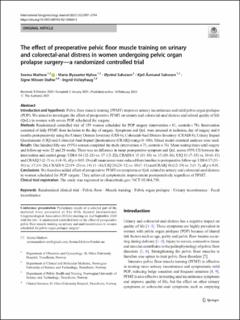| dc.contributor.author | Mathew, Seema | |
| dc.contributor.author | Nyhus, Maria Øyasæter | |
| dc.contributor.author | Salvesen, Øyvind | |
| dc.contributor.author | Salvesen, Kjell Å | |
| dc.contributor.author | Stafne, Signe Nilssen | |
| dc.contributor.author | Volløyhaug, Ingrid | |
| dc.date.accessioned | 2022-02-17T11:25:44Z | |
| dc.date.available | 2022-02-17T11:25:44Z | |
| dc.date.created | 2021-12-01T10:52:41Z | |
| dc.date.issued | 2021 | |
| dc.identifier.citation | International Urogynecology Journal. 2021, 32 (10), 2787-2794. | en_US |
| dc.identifier.issn | 0937-3462 | |
| dc.identifier.uri | https://hdl.handle.net/11250/2979649 | |
| dc.description.abstract | Introduction and hypothesis Pelvic floor muscle training (PFMT) improves urinary incontinence and mild pelvic organ prolapse (POP). We aimed to investigate the effect of preoperative PFMT on urinary and colorectal-anal distress and related quality of life (QoL) in women with severe POP scheduled for surgery. Methods Randomized controlled trial of 159 women scheduled for POP surgery (intervention = 81, controls = 78). Intervention consisted of daily PFMT from inclusion to the day of surgery. Symptoms and QoL were assessed at inclusion, day of surgery and 6 months postoperatively using the Urinary Distress Inventory (UDI-6), Colorectal-Anal Distress Inventory (CRADI-8), Urinary Impact Questionnaire (UIQ) and Colorectal-Anal Impact Questionnaire (CRAIQ) (range 0–100). Mixed model statistical analyses were used. Results One hundred fifty-one (95%) women completed the study (intervention = 75, controls = 76). Mean waiting times until surgery and follow-up were 22 and 28 weeks. There was no difference in mean postoperative symptom and QoL scores (95% CI) between the intervention and control group: UDI-6 16 (12–21) vs. 17 (13–22), CRADI-8 15 (11–18) vs. 13 (10–16), UIQ 11 (7–15) vs. 10 (6–13) and CRAIQ 5 (2–7) vs. 6 (4–9), all p > 0.05. Overall mean scores were reduced from baseline to postoperative follow-up: UDI-6 37 (33–41) vs. 17 (14–20), CRADI-8 22 (19–25) vs. 14 (11–16); UIQ 28 (24–32) vs. 10 (7–13) and CRAIQ 16 (12–19) vs. 5 (3–7), all p < 0.01. Conclusions We found no added effect of preoperative PFMT on symptoms or QoL related to urinary and colorectal-anal distress in women scheduled for POP surgery. They achieved symptomatic improvement postoperatively regardless of PFMT. Clinical trial registration: The study was registered in clinicaltrials.gov: NCT 03,064,750 | en_US |
| dc.language.iso | eng | en_US |
| dc.publisher | Springer | en_US |
| dc.rights | Navngivelse 4.0 Internasjonal | * |
| dc.rights.uri | http://creativecommons.org/licenses/by/4.0/deed.no | * |
| dc.title | The effect of preoperative pelvic floor muscle training on urinary and colorectal-anal distress in women undergoing pelvic organ prolapse surgery—a randomized controlled trial | en_US |
| dc.type | Peer reviewed | en_US |
| dc.type | Journal article | en_US |
| dc.description.version | publishedVersion | en_US |
| dc.source.pagenumber | 2787-2794 | en_US |
| dc.source.volume | 32 | en_US |
| dc.source.journal | International Urogynecology Journal | en_US |
| dc.source.issue | 10 | en_US |
| dc.identifier.doi | 10.1007/s00192-021-04684-3 | |
| dc.identifier.cristin | 1962502 | |
| cristin.ispublished | true | |
| cristin.fulltext | original | |
| cristin.qualitycode | 1 | |

